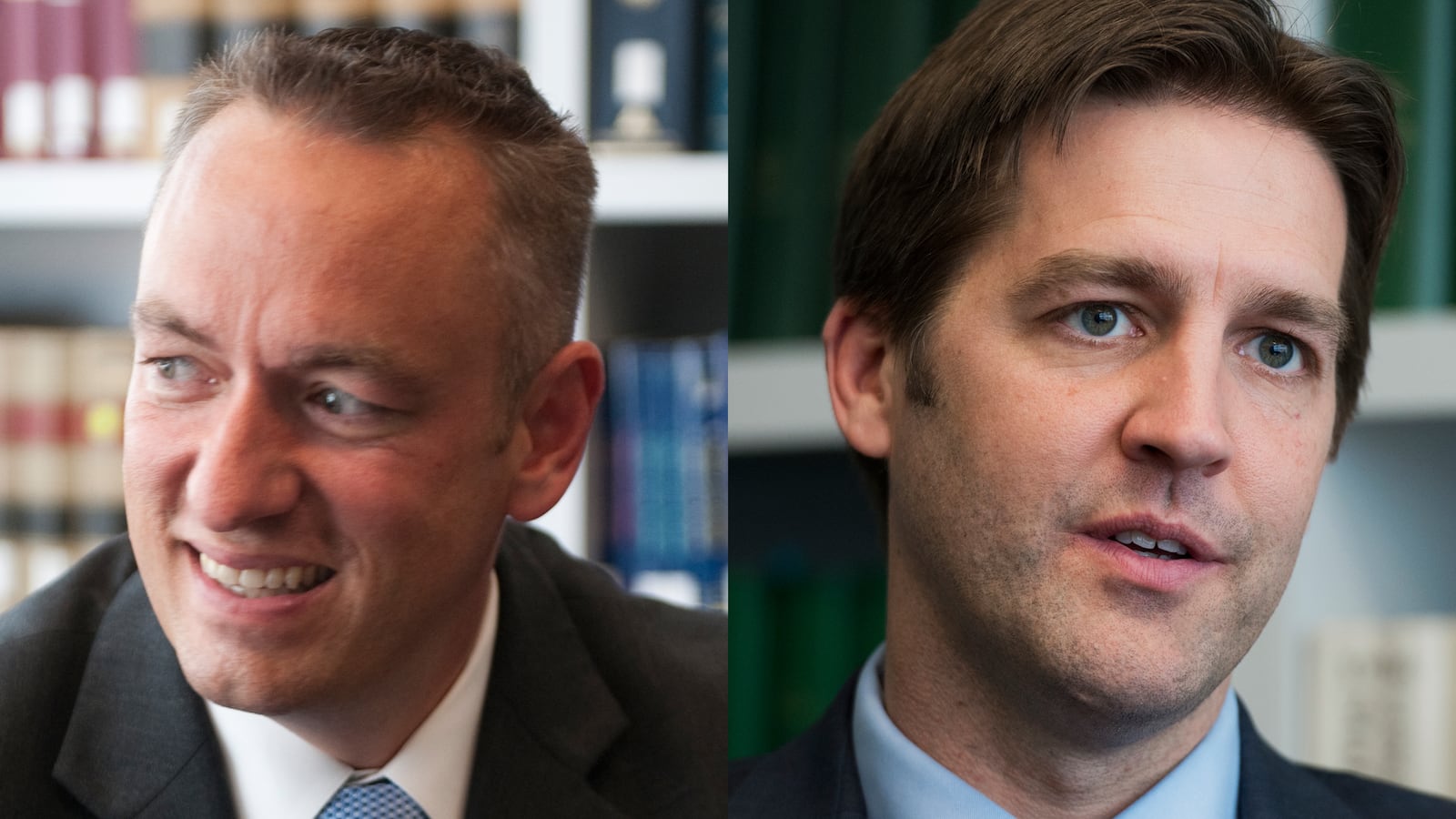In Nebraska, major Tea Party groups are facing off against each other in a Republican Senate primary that features four competitive candidates. But what are the ideological differences in this race?

Pretty much nothing, actually.
None of the candidates, including the two with support from national Tea Party groups, Shane Osborn and Ben Sasse, really vary in their beliefs. Instead, this has become a race driven entirely by personality with few policy differences among the four candidates.
The two top contenders, Osborn and Sasse, both seem straight out of conservative central casting. Osborn, 39, is a former state treasurer who spent 24 days imprisoned in China after the Chinese air force rammed the Navy reconnaissance plane he was piloting over international waters and forced him to make a crash landing on Hainan Island. For his skill in guiding the plane and its crew to safety, Osborn was awarded a Distinguished Flying Cross. Sasse, 41, has a bachelor’s degree from Harvard, a Ph.D. from Yale, and worked in Washington as a health-policy expert in the Bush administration before returning to Nebraska to become a college president. Between the two, they have endorsements from just about every conservative group in Washington.
Sasse has been endorsed by the Club for Growth, the Senate Conservatives Fund, the Family Research Council, Paul Ryan, and Sarah Palin. Osborn is backed by FreedomWorks, Concerned Women for America, and Phyllis Schafly. But the opposition between the two isn’t exactly heated. As Matt Kibbe, the head of FreedomWorks, put it in a radio interview this month, “So you’re either going to be stuck with Mike Lee’s favorite candidate or FreedomWorks’s favorite candidate, and I’d call that a win-win.” Kibbe did then take pains to point out that he was right and Lee was wrong. But there are two other candidates as well who are soldiering along without any national attention.
Bringing up the rear: Sid Dinsdale, a community banker with roots in the rural part of state and who happens to have a fortune in the nine figures, and Bart McLeay, a well-connected Omaha lawyer who was already running TV ads during the Winter Olympics. A lot can still change in the race and anyone could win, although Nebraska political insiders agree that McLeay has a tougher path to victory than Dinsdale, who could flood the state’s airwaves with one personal check. (He told The Daily Beast that he would “invest some money,” but declined to say how much.)
McLeay’s campaign is optimistic and doesn’t think endorsements particularly matter in the race. Phil Young, an adviser to McLeay’s campaign, conceded that while in-state endorsements from outgoing Sen. Mike Johanns or Gov. Dave Heinemann could matter, he just didn’t think “outside endorsements mattered much.” In fact, he thought they could even backfire. Young noted that the state’s junior senator, Deb Fischer, was an outspent underdog facing two better-known challengers with outside support when she won her primary in 2012. In his opinion, her victory was “not a one-time anomaly,” but an example of something that happens frequently when the state’s “prairie populism” gets riled up by ”outside money.”
Dinsdale is dismissive of endorsements as well. When asked about the affect of Palin’s endorsement in particular on the day she endorsed Sasse, he said “That’s a darn good question, I’m sure it means something. But generally Nebraskans are pretty independent and don’t want to be told who to vote for, so we’ll see how that plays out. I’m not seeking those, what do you call her, celebrity endorsers.” He acknowledged there was little difference on the issues among all four contenders. “I’m not sure ideologically there is much separation.”
Chris Peterson, former executive director of the Nebraska GOP, agreed. “I’m just not seeing any differences, while Sasse has some health-care background that allows him to be more authoritative, all four candidates are singing from the same hymnal on the fact that they want it repealed and want some kind of health-care reform that’s market-oriented and patient-centered.”
Instead, the race becomes about personalities and gaffes.
Sasse is particularly vulnerable in this regard. While he heralds his leadership of Midland University, the college is on notice with the Higher Learning Commission, which is responsible for its accreditation as a degree-granting institution. He also has been under fire for his role as a consultant for a firm that helped clients implement the Affordable Care Act, a big no-no for a candidate running on the strength of strenuous opposition to Obamacare. Sasse hasn’t been helped either by a disastrous interview with Fox News’s John Stossel about his proposal to move the Capitol—as in relocating the entire capital of the United States—to Nebraska. However, none of this has fazed his outside backers. Barney Keller, a spokesman for Club for Growth, praised Sasse for his “core ideology, which leads him to be able to articulate to voters and the general public why Obamacare is bad and how it hurts economic growth.” In Keller’s opinion, “anyone can say talking points but [Sasse] can articulate.”
Yet for all the hullabaloo about outside groups, the race may simply come down to old-fashioned retail politics. Peterson was skeptical that outside groups would end up spending a lot of money in the state. (So far, only one outside group, the Legacy Action Foundation Fund, has invested in the primary, spending $300,000 on pro-Sasse ads.) “It would just seem to me that any conservative organization would be much better off spending those dollars in a place where they could actually have an impact on a Senate vote that will make a difference in Washington one way or another, rather than choosing between different hues of red,” he said.





